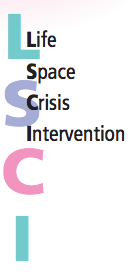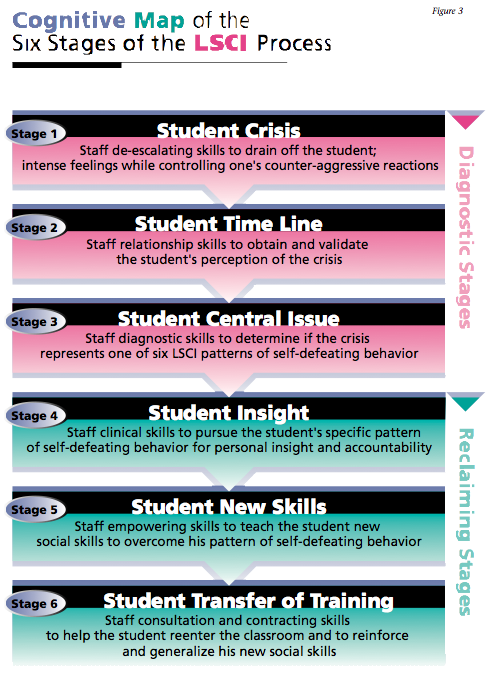LIFE Space CRISIS INTERVENTION [LSCI]

"Educators and other youth professionals are searching for more effective means of dealing with troubled young persons whose unresolved conflicts can escalate into explosive violence and pose serious dangers to both staff and youth" (LSCI - Moodle).
Overview
Crisis intervention requires empathic listening, a technique that allows the person in crisis to feel heard without being judged. This method asks the listener to focus on the thoughts and feelings of the speaker. Helping the speaker feel that he or she is understood reduces stress and defensiveness, clearing the way for clearer thinking about the problem at hand.
History
"Originally, this therapeutic strategy was called “life space interview” by Fritz Redl and David Wineman, co-authors of The Aggressive Child. Their model was refined at the University of Michigan and the National Institute of Mental Health by William Morse and Nicholas Long, co-authors of Conflict In The Classroom. In 1992, Mary Wood of the Developmental Therapy Institute co-authored with Nicholas Long, Life Space Intervention: Talking To Children In Crisis" (Reclaiming Youth International).
What is LSCI?
"LSCI is a therapeutic strategy for using crisis situations as opportunities to help students learn alternatives to patterns of aggressive, disrespectful, or self-demeaning behavior. LSCI is being successfully used by teachers, counselors, alternative and special educators, mental health and juvenile justice staff, residential child care professionals, administrators, and others who deal directly with youth in conflict in family, school and community. LSCI blends psycho-dynamic, cognitive, behavioral and pro-social methods to develop powerful teaching and treatment interventions for our most challenging youth" (Reclaiming Youth International).
References
Source: http://www.reclaiming.com/content/trainings/life-space-crisis-intervention
Source: https://courses201301.hope.edu/mod/resource/view.php?id=16736
*The last source can only be located if the user has a Moodle account at Hope College.
Below is a diagram displaying a cognitive map of the six stages of the Life Skills Crisis Intervention Process.
Overview
Crisis intervention requires empathic listening, a technique that allows the person in crisis to feel heard without being judged. This method asks the listener to focus on the thoughts and feelings of the speaker. Helping the speaker feel that he or she is understood reduces stress and defensiveness, clearing the way for clearer thinking about the problem at hand.
History
"Originally, this therapeutic strategy was called “life space interview” by Fritz Redl and David Wineman, co-authors of The Aggressive Child. Their model was refined at the University of Michigan and the National Institute of Mental Health by William Morse and Nicholas Long, co-authors of Conflict In The Classroom. In 1992, Mary Wood of the Developmental Therapy Institute co-authored with Nicholas Long, Life Space Intervention: Talking To Children In Crisis" (Reclaiming Youth International).
What is LSCI?
"LSCI is a therapeutic strategy for using crisis situations as opportunities to help students learn alternatives to patterns of aggressive, disrespectful, or self-demeaning behavior. LSCI is being successfully used by teachers, counselors, alternative and special educators, mental health and juvenile justice staff, residential child care professionals, administrators, and others who deal directly with youth in conflict in family, school and community. LSCI blends psycho-dynamic, cognitive, behavioral and pro-social methods to develop powerful teaching and treatment interventions for our most challenging youth" (Reclaiming Youth International).
References
Source: http://www.reclaiming.com/content/trainings/life-space-crisis-intervention
Source: https://courses201301.hope.edu/mod/resource/view.php?id=16736
*The last source can only be located if the user has a Moodle account at Hope College.
Below is a diagram displaying a cognitive map of the six stages of the Life Skills Crisis Intervention Process.
| lsci-article.pdf | |
| File Size: | 1938 kb |
| File Type: | |

